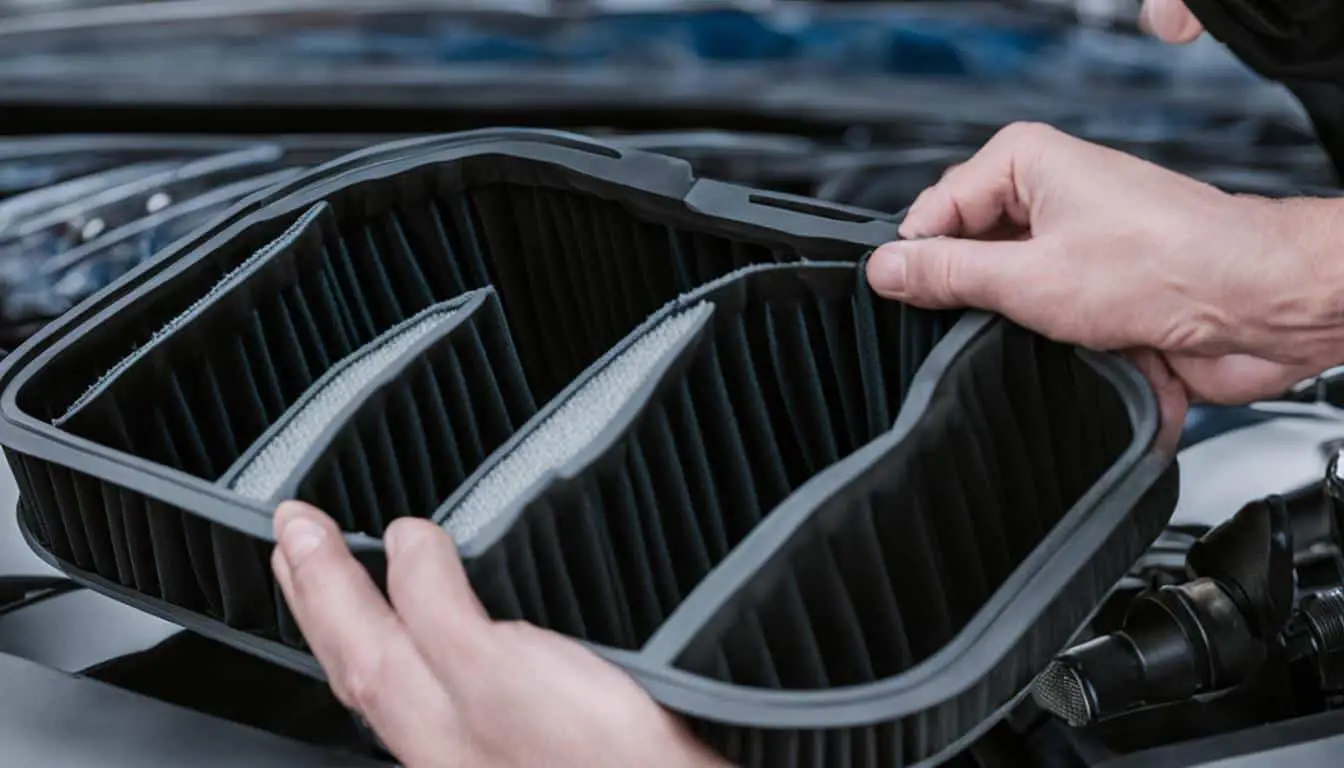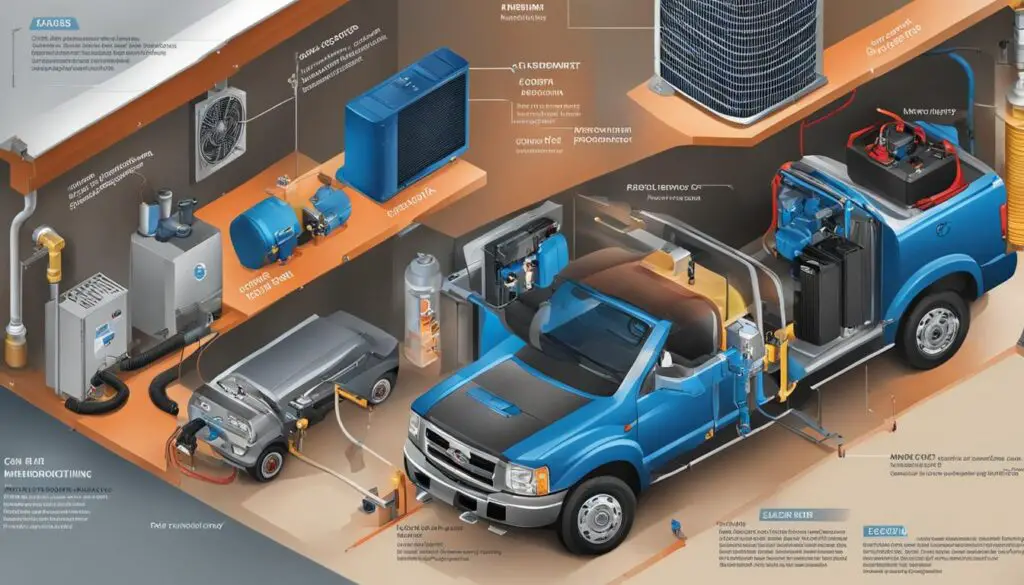
Understanding Your Car’s Air Conditioning System
As a car owner, you rely on your air conditioning system to keep you comfortable during the hot summer months. However, many drivers take this system for granted and neglect the necessary maintenance to keep it functioning optimally. In this section, I will provide you with an overview of your car’s air conditioning system and highlight the importance of regular maintenance.
The air conditioning system in your car consists of several components that work together to provide cool air to the cabin. These include the compressor, condenser, evaporator, and expansion valve. Without proper maintenance, these components can become clogged with dirt and debris, reducing their efficiency and potentially damaging the system.
Regular maintenance is essential to ensure that your car’s air conditioning system continues to operate smoothly. By taking the time to perform routine checks and cleaning, you can extend the lifespan of your AC system and ensure that it runs efficiently throughout the year.
Key Takeaways:
- Regular maintenance is crucial for optimal performance of your car’s air conditioning system.
- The AC system consists of several components that work together to provide cool air to the cabin.
- Neglecting maintenance can reduce efficiency and potentially damage the system.
- Performing routine checks and cleaning extends the lifespan of your AC system and ensures efficient operation.
- Don’t wait until your system breaks down to perform maintenance; schedule regular service and inspections to prevent costly repairs.
The Importance of Car Air Conditioning System Maintenance
As a car owner, it’s essential to keep your car’s air conditioning (AC) system in optimal condition to ensure it operates efficiently. Neglecting maintenance can lead to reduced cooling efficiency and, in some cases, damage other components of the system, leading to costly repairs.
To avoid expensive repairs and ensure your AC system operates seamlessly, you need to schedule regular AC system service. Here are a few AC maintenance tips you can follow to keep your car air conditioning working optimally:
- Check the refrigerant levels regularly and recharge them when required. Low refrigerant levels can put excessive pressure on the AC compressor, leading to damage.
- Replace the air filters every six months or as recommended by the manufacturer. Dirty filters can reduce airflow, reducing cooling efficiency. Plus, dirty filters can harbor bacteria and allergens, leading to bad odors and triggering allergies.
- Inspect the compressor and condenser for any damage or leaks. Corrosion and leaks can cause refrigerant leaks, leading to a system malfunction.
You can use a car AC maintenance checklist to ensure you cover all the essential maintenance tasks. Here’s a sample car AC maintenance checklist:
| Task | Frequency |
|---|---|
| Check refrigerant level | Annually |
| Replace air filters | Every six months/ as recommended by the manufacturer |
| Inspect compressor and condenser | Annually |
| Clean condenser fins | Annually |
| Check drive belt tension | Annually |
Following this AC maintenance checklist can help keep your car air conditioning system in optimal condition.
Methods for Car Air Conditioning System Maintenance
Now that we understand the importance of maintaining our car’s air conditioning system, let’s dive into practical methods for proper maintenance. Here is a step-by-step guide for maintaining your car’s AC system:
Clean or Replace Air Filters
Dirty air filters can cause reduced cooling efficiency and even damage your AC system over time. To clean or replace them:
- Locate the air filter under the hood of your car. It’s usually in a plastic housing on one side of the engine.
- Open the housing and remove the old filter.
- If it’s dirty, use a soft-bristled brush or compressed air to clean it. If it’s damaged or worn out, replace it with a new one.
- Close the housing and make sure it’s secure.
Check and Recharge Refrigerant Levels
A lack of refrigerant can cause your AC system to blow warm air. Here’s how to check and recharge refrigerant levels:
- Locate the low-pressure port under the hood of your car. It’s usually located near the AC compressor.
- Attach a gauge to the port and check the pressure. If it’s too low, add refrigerant until it reaches the recommended level.
- Be careful not to overfill the system as this can cause damage.
Inspect the Compressor and Condenser
The compressor and condenser are essential components of your AC system that need regular inspection. Here’s how:
- Inspect the exterior of the compressor and condenser for any signs of damage, such as cracks or leaks.
- Check the hoses, connections, and wiring for any signs of wear or damage.
- If you notice any issues, have them repaired by a professional.
By following these routine maintenance tasks, you can keep your car’s air conditioning system in optimal condition and avoid costly repairs in the long run.

Remember, if you’re unsure about any of these steps, it’s always best to consult a professional technician who can provide expert advice and service.
Conclusion
In conclusion, as a professional copywriting journalist, I understand the importance of maintaining your car’s air conditioning system. Regular maintenance is crucial for ensuring optimal performance and preventing costly repairs in the long run. By following the step-by-step guidelines provided in this article and implementing the tips and checklist, you can keep your car’s AC system in top shape.
As I have discussed in the previous sections, understanding the different components of your car’s air conditioning system and knowing how to maintain them is key. Neglecting maintenance can lead to reduced cooling efficiency, potential damage to other system components, and higher repair costs. By staying on top of maintenance tasks, you can enjoy a reliable and effective air conditioning system in your car for years to come.
Thank you for reading this article on car air conditioning system maintenance. I hope the information provided has been helpful and informative. Please feel free to reach out to me with any further questions or concerns. As a professional copywriting journalist, I am always here to help.
FAQ
How often should I perform maintenance on my car’s air conditioning system?
It is recommended to have your car’s air conditioning system serviced and inspected annually or at least once every two years. Regular maintenance helps ensure optimal performance and prevents potential issues from arising.
What are the signs that my car’s air conditioning system needs maintenance?
Some common signs that indicate your car’s air conditioning system may require maintenance include weak airflow, warm air blowing from the vents, unusual odors, or strange noises when the system is running. If you notice any of these signs, it is advisable to have your AC system checked by a professional technician.
Can I perform maintenance on my car’s air conditioning system myself?
While there are some maintenance tasks you can perform on your own, such as cleaning or replacing the air filters, it is recommended to have a qualified technician inspect and service your AC system. They have the necessary expertise and equipment to identify and address any underlying issues effectively.
How long does a typical air conditioning system service take?
The duration of an air conditioning system service depends on the specific tasks involved and the condition of your system. On average, a routine service can take anywhere from 1 to 2 hours. However, if any repairs or additional maintenance are required, it may take longer.
What are the benefits of regular maintenance for my car’s air conditioning system?
Regular maintenance for your car’s air conditioning system offers several benefits. It helps maintain optimal cooling efficiency, ensures clean and healthy air circulation, prevents potential system failures, extends the lifespan of the system components, and contributes to overall driving comfort.
